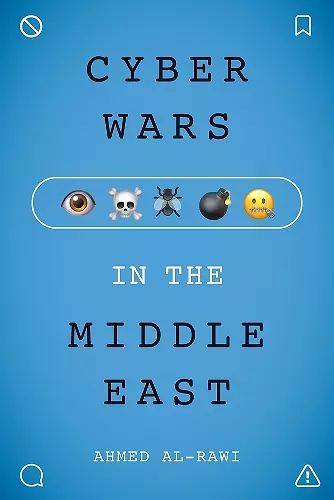Cyberwars in the Middle East
Format:Hardback
Publisher:Rutgers University Press
Published:16th Jul '21
Should be back in stock very soon
This hardback is available in another edition too:
- Paperback£25.99(9781978810105)

Cyberwars in the Middle East argues that hacking is a form of online political disruption whose influence flows vertically in two directions (top-bottom or bottom-up) or horizontally. These hacking activities are performed along three political dimensions: international, regional, and local. Author Ahmed Al-Rawi argues that political hacking is an aggressive and militant form of public communication employed by tech-savvy individuals, regardless of their affiliations, in order to influence politics and policies. Kenneth Waltz’s structural realism theory is linked to this argument as it provides a relevant framework to explain why nation-states employ cyber tools against each other.
On the one hand, nation-states as well as their affiliated hacking groups like cyber warriors employ hacking as offensive and defensive tools in connection to the cyber activity or inactivity of other nation-states, such as the role of Russian Trolls disseminating disinformation on social media during the US 2016 presidential election. This is regarded as a horizontal flow of political disruption. Sometimes, nation-states, like the UAE, Saudi Arabia, and Bahrain, use hacking and surveillance tactics as a vertical flow (top-bottom) form of online political disruption by targeting their own citizens due to their oppositional or activists’ political views. On the other hand, regular hackers who are often politically independent practice a form of bottom-top political disruption to address issues related to the internal politics of their respective nation-states such as the case of a number of Iraqi, Saudi, and Algerian hackers. In some cases, other hackers target ordinary citizens to express opposition to their political or ideological views which is regarded as a horizontal form of online political disruption. This book is the first of its kind to shine a light on many ways that governments and hackers are perpetrating cyber attacks in the Middle East and beyond, and to show the ripple effect of these attacks.
"Cyberwars in the Middle East offers a much-needed and astute take on the increasingly crucial role hacking and cyberoperations are playing across the Middle East. With empirical breadth and assiduous attention to detail Al-Rawi documents the multiple forms of ‘online political disruption’ that have become an inextricable part of the new digital authoritarianism that has arisen in the post-Arab Uprising milieu. A hugely important read."— Marc O. Jones, author of Political Repression in Bahrain
ISBN: 9781978810112
Dimensions: 229mm x 152mm x 14mm
Weight: 4g
192 pages